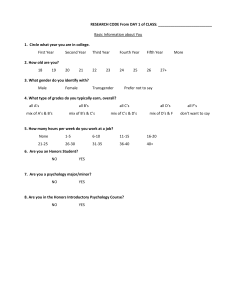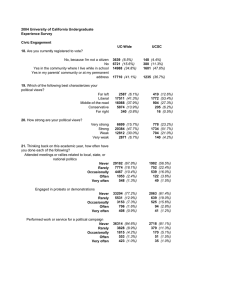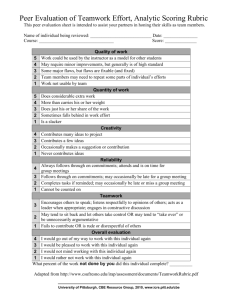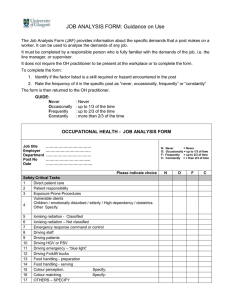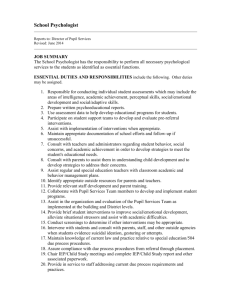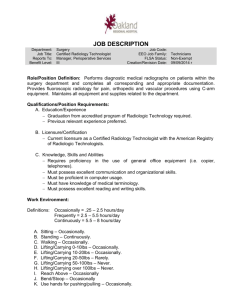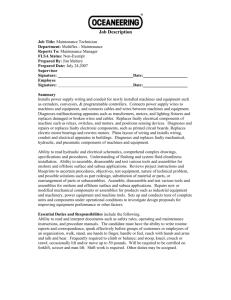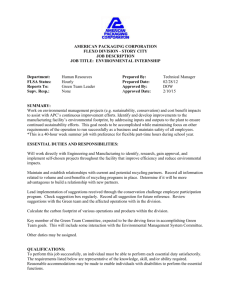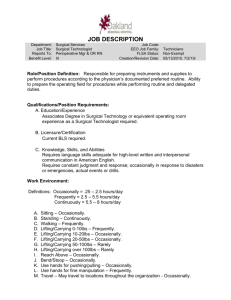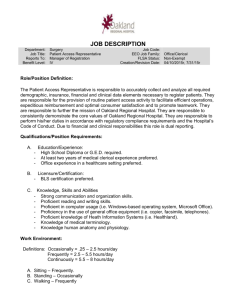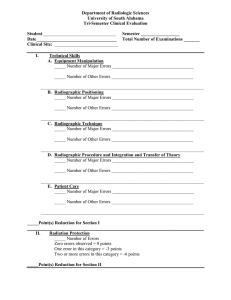PreAssessmentPBLintro
advertisement
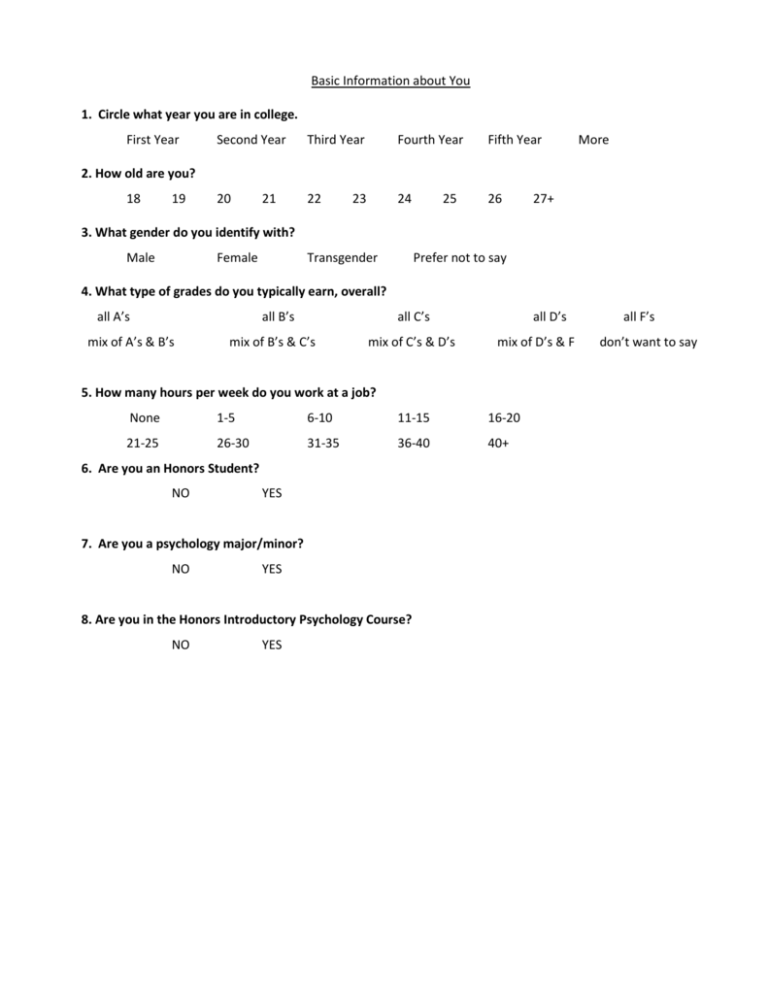
Basic Information about You 1. Circle what year you are in college. First Year Second Year Third Year Fourth Year Fifth Year 20 22 24 26 More 2. How old are you? 18 19 21 23 25 27+ 3. What gender do you identify with? Male Female Transgender Prefer not to say 4. What type of grades do you typically earn, overall? all A’s all B’s mix of A’s & B’s all C’s mix of B’s & C’s mix of C’s & D’s all D’s mix of D’s & F 5. How many hours per week do you work at a job? None 1-5 6-10 11-15 16-20 21-25 26-30 31-35 36-40 40+ 6. Are you an Honors Student? NO YES 7. Are you a psychology major/minor? NO YES 8. Are you in the Honors Introductory Psychology Course? NO YES all F’s don’t want to say SEQ-M Please respond to the following items by circling the number that best represents your answer. Think about the last set of classes you have taken while answering these questions. A. During your past classes, about how often did you do each of the following? 1. Asked questions during class 1: never 2: occasionally 3: often 4:very often 3: often 4:very often 2. Contributed to class discussions 1: never 2: occasionally 3. Worked with other students to solve problems in class 1: never 2: occasionally 3: often 4:very often 4. Worked with classmates outside of class to complete assignments 1: never 2: occasionally 3: often 4:very often 5. Actively participated in small-group discussions 1: never 2: occasionally 3: often 4:very often 3: often 4:very often 3: often 4:very often 3: often 4:very often 6. Taught/helped other students in the class 1: never 2: occasionally 7. Put forth strong effort 1: never 2: occasionally 8. Stayed up to date with readings/studying 1: never 2: occasionally B. To what extent have your past courses, on average, emphasized the mental activities listed below? 1. Memorizing facts, ideas, or methods from your course and readings so you can repeat them in almost the same form 1: very little 2: some 3: quite a bit 4: very much 2. Analyzing the basic elements of an idea, experience or theory such as examining a specific case or situation in depth and considering its components 1: very little 2: some 3: quite a bit 4: very much 3. Synthesizing and organizing ideas, information, or experiences into new, more complicated interpretations and relationships 1: very little 2: some 3: quite a bit 4: very much 4. Evaluating the value of information, arguments, or methods such as examining how others gathered and interpreted data and assessing the accuracy of their conclusions 1: very little 2: some 3: quite a bit 4: very much 5. Applying theories and/or concepts to practical (real life) problems 1: very little 2: some 3: quite a bit 4: very much C. To what extent have you experienced the following in your past courses, on average? 1. Developed enthusiasm and interest to learn more 1: very little 2: some 3: quite a bit 4: very much 2. Was motivated to complete course assignments/study 1: very little 2: some 3: quite a bit 4: very much 3. Increased my effort to understand course content 1: very little 2: some 3: quite a bit 4: very much 4. Had fun in class 1: very little 4: very much 2: some 3: quite a bit 5. Thought about the course content between class meetings 1: very little 2: some 3: quite a bit 4: very much 6. Found ways to make the course material relevant to my life 1: very little 2: some 3: quite a bit 4: very much 7. Appreciated the contribution and impact the topic had on multiple aspects of life 1: very little 2: some 3: quite a bit 4: very much 8. Valued the topic as a science (for this item think of classes like sociology, psych, history) 1: very little 2: some 3: quite a bit 4: very much 9. Was excited to go to class 1: very little 2: some 3: quite a bit 10. Was energized and invested in learning about the topic 1: very little 2: some 3: quite a bit 4: very much 4: very much D. To what extent have your past courses, on average, contributed to improvements in your knowledge, skills, and personal development in the following ways? 1. Ability to find, read, and analyze information 1: very little 2: some 3: quite a bit 4: very much 2. Writing clearly, accurately, and effectively 1: very little 2: some 3: quite a bit 4: very much 3. Thinking critically 1: very little 4: very much 2: some 3: quite a bit 4. Learning effectively on your own so you can identify, research, and complete a given task 1: very little 2: some 3: quite a bit 4: very much 5. Working effectively with other individuals 1: very little 2: some 3: quite a bit 4: very much 6. Developing stronger analytic skills for examining issues in the real world 1: very little 2: some 3: quite a bit 4: very much 7. Learning how to obtain and integrate information from a variety of sources 1: very little 2: some 3: quite a bit 4: very much To what extent have your past courses, on average, contributed to improvements in your knowledge, skills, and personal development in the following ways? (continued) 8. Supporting an argument/position using data 1: very little 2: some 3: quite a bit 4: very much 9. Being skeptical about claims and data presented by others 1: very little 2: some 3: quite a bit 4: very much 10. Wanting to consider alternative perspectives before drawing a conclusion/making a decision 1: very little 2: some 3: quite a bit 4: very much CTE: Please read each item then state whether or not there is a problem with the person’s conclusion And, if there is a problem, explain what it is. 1. Years ago, some psychologists observed that the parents of autistic children appeared very aloof and detached from their autistic children. Unable to conduct a psychological experiment to determine the cause of autism, these psychologists concluded that parental detachment was the cause of autism. 2. A researcher tested a new drug designed to decrease depression. She gave it to 100 clinically depressed patients and discovered that their average level of depression, as measured by a standardized depression inventory, declined after 4 months of taking the drug. She concluded that the drug reduces depression. 3. A developmental psychologist conducted a longitudinal study of moral development using a group of 200 boys beginning at age 8 and continuing through age 14. The findings demonstrated that there are identifiable stages of development occurring across the age periods studied. In the publication of the results, the psychologist names the stages and concludes that they represent the stages of typical moral development for all children, ages 8-14. 4. In order to test-market their new detergent, a company sent free samples to 300 randomly selected households. A few weeks later, they called them and asked, “Are you amazed at how much cleaner and brighter your clothes are after using our new detergent?” About 90% of the 300 respondents said, “yes.” The company concluded that their new detergent cleans and brightens clothes very effectively. 5. A psychiatrist and geneticist discovered one particular gene common to a group of 50 people who suffer from schizophrenia. A control group of 50 normal people did not have this gene. They concluded that this gene is indeed the cause of schizophrenia. Thank-You for Your Honest Responses!
